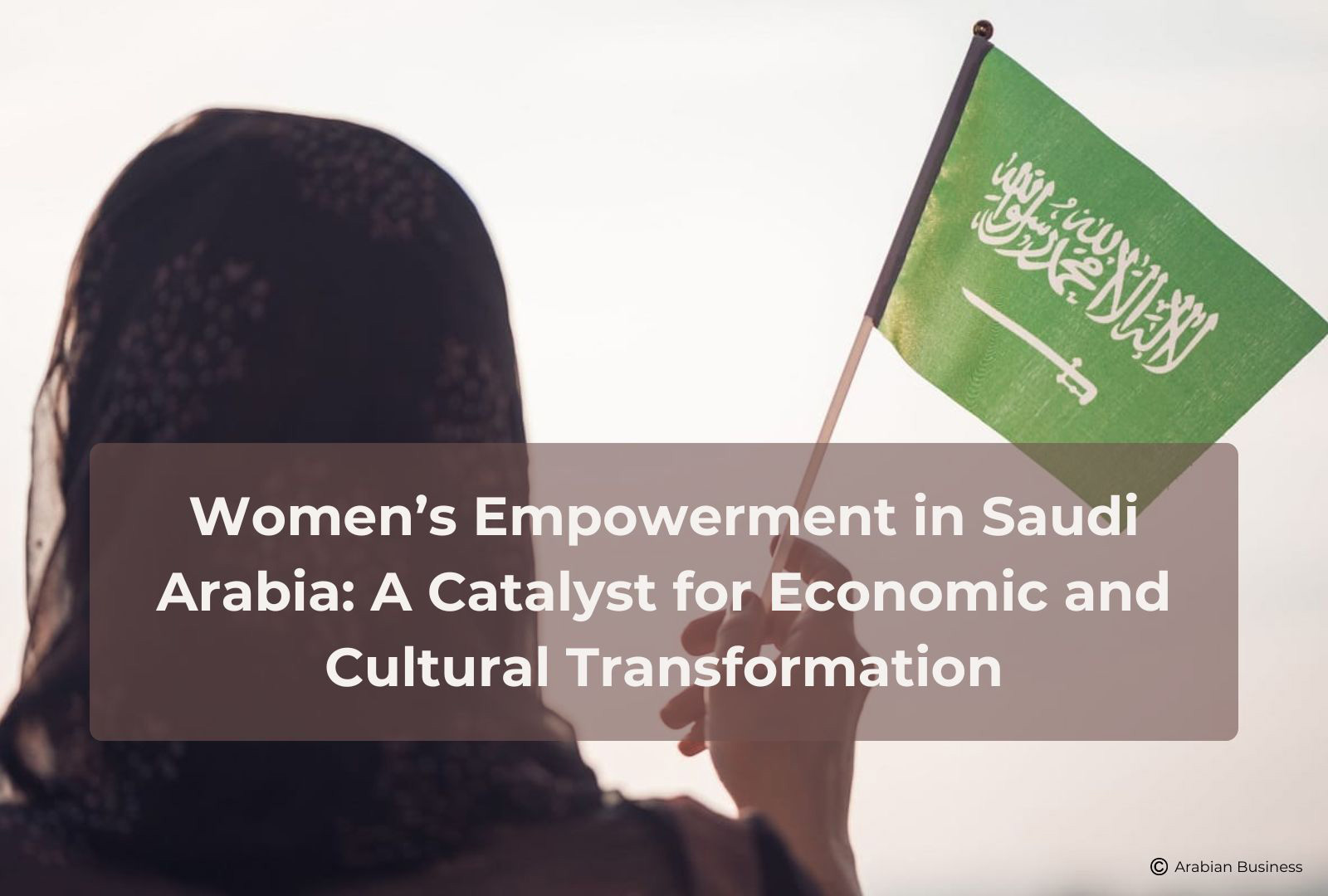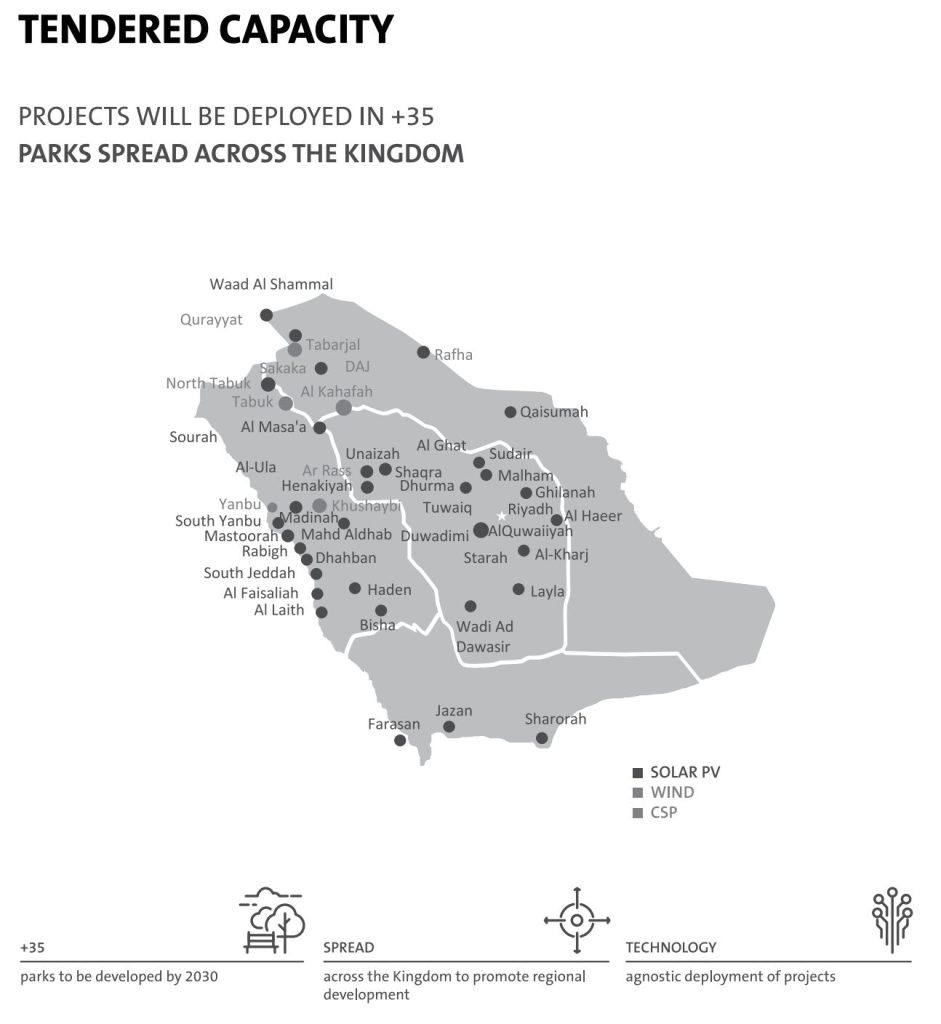
Home » Saudi Arabia’s Clean Energy Revolution: Vision 2030 and EU-KSA Strategic Cooperation in the Green Transition
Saudi Arabia is actively engaged in renewable energy generation since 2018. As of the end of 2024, the Kingdom’s operational renewable energy capacity reached approximately 6.5 GW, with over 44 GW of renewable energy capacity under development and further large tenders planned. Notably, throughout 2025, new contracts have been signed to develop an additional 15 GW of solar and wind projects, expected to become operational between 2027 and 2028, reinforcing Saudi Arabia’s position as a regional leader in clean energy. The target announced by the Minister of Energy Prince Abdulaziz bin Salman is to add 20 GW of renewable energy annually to reach 130 GW of renewable energy before 2030. The Saudi and Middle East Green Initiatives are expanding the broader green economy, with investments of around €160 billion so far (SGI, 2025). Further, NEOM Green Hydrogen Company, which will host the world’s largest green hydrogen facility, achieved 80% construction completion by early 2025. The project integrates about 4 GW of renewable power capacity and is expected to produce around 600 tons of green hydrogen daily, with a targeted commissioning date in 2027.
Saudi Arabia’s renewable energy policies contribute significantly to achieving a number of the Kingdom’s ambitious Vision 2030 objectives. These policies support reducing the country’s dependence on fossil fuels within the national economy, while leveraging more crude oil for international and regional export, thus reinforcing the Kingdom’s position in global energy markets. This approach aligns with regional trade frameworks such as the Greater Arab Free Trade Area (GAFTA), and is underpinned by the development of strategic partnerships, notably with the European Union, to enhance cooperation and energy exports, though such agreements are in stages of negotiation or further consolidation. Furthermore, these policies are driving the emergence of new industries nationwide, fostering localisation of expertise and skills among the Saudi population, and supporting the transformation of Saudi Arabia into a knowledge-based economy, fully in line with the aims for diversification and sustainable growth set out in Vision 2030.
The Kingdom is well positioned to develop clean energy generation using wind and solar projects, with internationally recognised high potential for both energy sources. Saudi Arabia aims to increase its renewable generation capacity from just over 1% to 50% of the nation’s total electricity production by 2030. To support industry, the development of clean energy parks includes pre-arranged geotechnical, hydrology, and grid-impact surveys, boosting the bankability and accelerated execution of projects for prospective developers. Progress has been concrete, as approximately 1.14 million housing units were supplied with electricity from renewables by the end of 2024, according to the General Authority for Statistics.

Figure: Invest Saudi Renewable Energy Brochure (MISA, 2024)
Clean energy generation projects form a core part of the long-term effort by Saudi Arabia to become carbon neutral by 2060. Several energy generation projects are well underway, and their implementation has intensified greatly since 2019. The same year, the Saudi Industrial Development Fund became the financial enabler of the National Renewable Energy Program (NREP), targeting the generation of 58.7GW by 2030 with 40GW in solar photovoltaic, 16GW in onshore wind, and 2.7GW hybrid generation and storage uses. In 2023, Minister of Energy Prince Abdulaziz bin Salman announced that Saudi Arabia aims to add 20 GW of renewable energy annually to reach 130 GW of renewable energy before 2030.
Other initiatives, such as the Circular Carbon Economy initiative, engage parallel aspects of the green transition, such as the greening of landscapes to absorb emissions. The national strategies also encompass the target of reducing Greenhouse Gas (GHG) emissions by 278 million tonnes of CO2eq annually by 2030, with 2019 being designated as the base year for the Nationally Determined Contribution (NDC), a climate action plan submitted to the United Nations Framework Convention on Climate Change (UNFCCC) under the Paris Agreement. The updated NDC was submitted in 2021 and is being subsequently implemented (UNFCCC, 2021).
Part of achieving the 50% renewable energy generation target involves improving the energy efficiency of existing infrastructure. The Saudi Energy Efficiency Program (SEEP) was launched in 2012, bringing together various stakeholders such as investors, regulators, and enablers to significantly enhance energy efficiency across the key sectors of industry, buildings, and transportation. This initiative addresses the anticipated steep rise in energy consumption driven by the Kingdom’s increasingly diversified and energy-intensive economy. Several international partnerships exist with EU member state energy ministries and energy companies to acquire world-class expertise in this field. Phase 3 of SEEP began implementation in 2024, introducing incentives aimed at raising minimum performance standards and encouraging both industry and households to invest in less energy-intensive products.
Tenders for the National Renewable Energy Program (NREP) clean energy projects across Saudi Arabia are issued in phases, enabling international industrial partners to competitively bid to meet the Kingdom’s energy needs. While tenders do not occur strictly every year, there has been a clear acceleration in project rollouts throughout the 2020s, especially in the second half of the decade, following extensive groundwork including site preparation and grid integration readiness.
EDF Renewables has been awarded two solar projects totalling 1.4 GW, the 1 GW Al-Masaa and the 400 MW Al-Henakiyah 2, in partnership with the Chinese State Power Investment Corporation (SPIC). Similarly, TotalEnergies secured the 300 MW Rabigh 2 solar project in partnership with the Saudi Aljomaih Energy and Water Company (AEW). Both projects are expected to be commissioned and integrated into the grid by 2026. These major projects build on existing collaborations, including TotalEnergies’ first solar plant at Wadi Ad-Dawasir, scheduled for commissioning in 2025. All these projects operate under 25-year Power Purchase Agreements (PPAs) with the Saudi Power Procurement Company (SPPC), structured on a build-own-operate (BOO) basis.
Beyond corporate tenders, there is a strong political consensus between the EU and Saudi Arabia on advancing clean energy generation and the green transition. Several EU member states alongside EU-level initiatives actively engage stakeholders from both regions to enhance cross-regional collaboration. The sixth IEF-EU Energy and Climate Day forum held in May 2025 convened EU and GCC stakeholders to explore practical, affordable, and sustainable energy futures, aiming to increase investment and policy alignment in decarbonisation, green hydrogen, and renewable energy. Additionally, the first EU-GCC Green Transition Forum took place in Abu Dhabi in October 2024, focusing on parallel environmental policies and climate adaptation implementation. These forums, alongside member state initiatives and tender processes, significantly drive EU-KSA cooperation in clean energy. Notably, the Director-General for Energy (DG ENER) from the European Commission visited Riyadh in April 2025 for a high-level roundtable, emphasising the deepening EU-KSA cooperation on the energy transition and renewable energy opportunities.
The Kingdom is positioning itself as a key enabler of cross-regional engagement in clean energy generation and green policies overall, enabling parallel approaches between regions to evolve. This historic and ambitious national transformation is underpinned by careful state-led planning and established partnerships. The coming years will be pivotal in integrating new clean energy generation projects into various regions and energy grids. International partnerships remain crucial to maintaining and accelerating momentum in the clean energy transition and fostering innovation.
The European Chamber of Commerce in the Kingdom of Saudi Arabia (ECCKSA) plays an increasingly vital role, providing a dedicated platform for European corporates and Saudi stakeholders to engage. In particular, the recently launched ECCKSA Energy Committee, is set to become the foremost reference platform for dialogue and cooperation between European companies and Saudi actors in the energy sector. This committee complements existing political forums by facilitating practical discussions on industrial issues, helping to close gaps and deepen EU-KSA collaboration in the green transition.
Membership
Committees
Events
News & Media
Publications
Other
About Us
Membership
Committees
Events
News & Media
Publications
Other